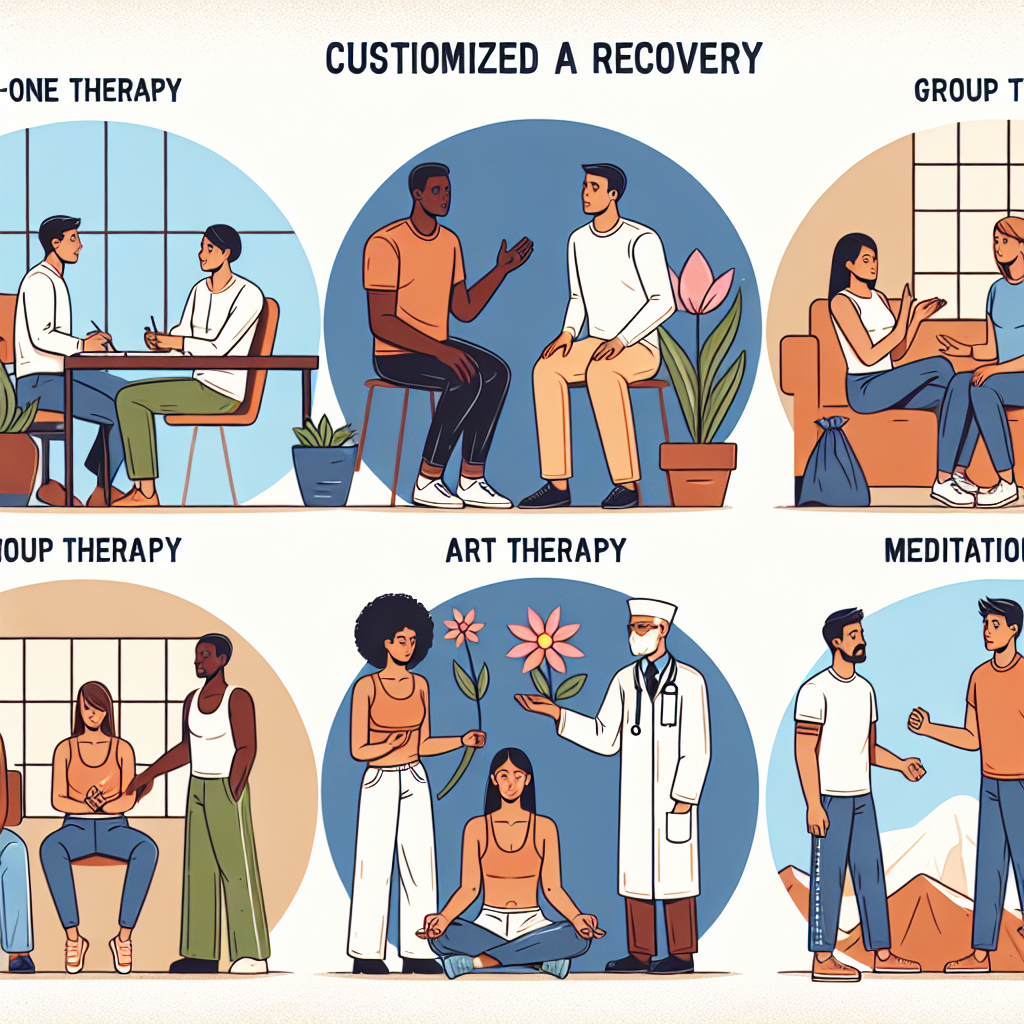-
Table of Contents

“Personalized Paths to Recovery: Tailored Addiction Services for Your Unique Journey”
Introduction
Addiction recovery services can indeed be customized to individual needs, recognizing that each person’s journey to recovery is unique. Tailored approaches consider various factors such as the type of substance used, the duration and severity of the addiction, co-occurring mental health disorders, and personal circumstances. By offering personalized treatment plans, including a combination of medical interventions, therapy, support groups, and holistic practices, recovery services can address the specific challenges and strengths of each individual. This customization enhances the effectiveness of the treatment, increases engagement, and improves the likelihood of long-term recovery success.
Personalized Approaches in Addiction Recovery: Tailoring Services to Individual Needs
In the realm of addiction recovery, the journey to sobriety is often as unique as the individuals embarking on it. Recognizing this, the field has increasingly embraced personalized approaches, tailoring services to meet the specific needs of each person. This shift towards customization is not merely a trend but a necessary evolution, driven by the understanding that a one-size-fits-all approach is insufficient for addressing the complexities of addiction.
The first step in personalizing addiction recovery services involves a comprehensive assessment of the individual’s physical, psychological, and social circumstances. This holistic evaluation allows healthcare providers to identify the unique factors contributing to the person’s addiction. For instance, some individuals may struggle with co-occurring mental health disorders such as depression or anxiety, which require integrated treatment plans that address both the addiction and the underlying mental health issues. By acknowledging and treating these co-occurring conditions, recovery services can significantly enhance the chances of long-term sobriety.
Moreover, personalized addiction recovery services often incorporate a variety of therapeutic modalities to cater to different preferences and needs. Cognitive-behavioral therapy (CBT), for example, is highly effective for individuals who benefit from structured, goal-oriented approaches. On the other hand, some may find solace in holistic therapies such as yoga, meditation, or art therapy, which focus on healing the mind, body, and spirit. By offering a diverse array of therapeutic options, recovery programs can empower individuals to choose the methods that resonate most with them, thereby increasing engagement and commitment to the recovery process.
Family involvement is another critical component of personalized addiction recovery. Addiction does not occur in a vacuum; it often affects and is affected by family dynamics. Customized recovery plans frequently include family therapy sessions, which aim to rebuild trust, improve communication, and create a supportive home environment. This family-centered approach not only aids the individual in recovery but also helps family members understand their role in the healing process, fostering a collective journey towards wellness.
Furthermore, cultural competence is essential in tailoring addiction recovery services. Cultural beliefs and values can significantly influence an individual’s perception of addiction and their willingness to seek help. Recovery programs that are sensitive to cultural differences can better address these nuances, ensuring that treatment is respectful and relevant. For example, incorporating traditional healing practices or providing services in the individual’s native language can make a substantial difference in their comfort level and overall success in the program.
The role of technology in personalized addiction recovery cannot be overlooked. Telehealth services, mobile apps, and online support groups offer flexible and accessible options for those who may face barriers to traditional in-person treatment. These digital tools can provide continuous support, track progress, and offer immediate assistance during moments of crisis, making recovery more manageable and less isolating.
Ultimately, the customization of addiction recovery services is about recognizing and honoring the individuality of each person. It is about creating a supportive environment where individuals feel seen, heard, and valued. By tailoring recovery plans to meet specific needs, we not only enhance the effectiveness of treatment but also inspire hope and resilience. The journey to sobriety is undoubtedly challenging, but with personalized approaches, it becomes a path paved with understanding, compassion, and the promise of a healthier, more fulfilling life.
The Benefits of Customized Addiction Recovery Plans for Long-Term Success
Addiction recovery is a deeply personal journey, and the path to sobriety is rarely linear. Each individual’s experience with addiction is unique, shaped by a myriad of factors including genetics, environment, mental health, and personal history. Recognizing this complexity, the concept of customized addiction recovery plans has gained traction as a more effective approach to achieving long-term success. By tailoring recovery services to meet the specific needs of each person, these personalized plans offer a more holistic and compassionate route to sobriety.
One of the primary benefits of customized addiction recovery plans is their ability to address the root causes of addiction. Traditional, one-size-fits-all programs often focus solely on the symptoms of addiction, neglecting the underlying issues that contribute to substance abuse. In contrast, personalized plans take into account the individual’s mental health, past traumas, and social circumstances. This comprehensive approach not only helps in managing the addiction itself but also in healing the emotional and psychological wounds that often accompany it. By addressing these root causes, individuals are better equipped to maintain their sobriety in the long term.
Moreover, customized recovery plans offer flexibility, allowing for adjustments as the individual progresses through their journey. Addiction recovery is not a static process; it evolves over time, and so do the needs of the person in recovery. Personalized plans can be modified to incorporate new therapies, coping strategies, and support systems as required. This adaptability ensures that the recovery process remains relevant and effective, providing continuous support tailored to the individual’s changing circumstances.
Another significant advantage of customized addiction recovery plans is the incorporation of a variety of therapeutic modalities. While some individuals may benefit from cognitive-behavioral therapy (CBT), others might find solace in holistic approaches such as yoga, meditation, or art therapy. By offering a diverse range of treatment options, personalized plans cater to the unique preferences and needs of each person. This variety not only enhances the effectiveness of the treatment but also makes the recovery process more engaging and less monotonous, thereby increasing the likelihood of sustained commitment.
Support systems play a crucial role in addiction recovery, and customized plans often emphasize the importance of building a strong network of support. Whether it’s through family therapy, peer support groups, or one-on-one counseling, personalized plans ensure that individuals have access to the emotional and social support they need. This network of support acts as a safety net, providing encouragement and accountability, which are essential for long-term success.
Furthermore, customized addiction recovery plans often include aftercare services, which are vital for maintaining sobriety post-treatment. Aftercare can involve regular check-ins with a counselor, ongoing participation in support groups, or even continued engagement in therapeutic activities. By providing a structured plan for life after treatment, these personalized plans help individuals navigate the challenges of reintegration into daily life, reducing the risk of relapse.
In conclusion, the benefits of customized addiction recovery plans are manifold. By addressing the root causes of addiction, offering flexibility, incorporating diverse therapeutic modalities, emphasizing support systems, and including aftercare services, these personalized plans provide a comprehensive and compassionate approach to recovery. They recognize the individuality of each person’s journey and offer tailored solutions that enhance the likelihood of long-term success. For those struggling with addiction, a customized recovery plan can be a beacon of hope, guiding them towards a healthier, more fulfilling life.
Q&A
1. **Question:** Can addiction recovery services be customized to individual needs?
**Answer:** Yes, addiction recovery services can be customized to individual needs to address specific circumstances, preferences, and requirements of each person.
2. **Question:** What factors are considered when customizing addiction recovery services?
**Answer:** Factors considered include the type of substance used, the duration and severity of the addiction, co-occurring mental health disorders, personal history, and social support systems.
Conclusion
Yes, addiction recovery services can be customized to individual needs. Customization is essential because addiction affects each person differently, influenced by factors such as the type of substance, duration of use, mental health status, and personal circumstances. Tailored approaches can include personalized therapy, medication management, support groups, and holistic treatments, all designed to address the unique challenges and strengths of each individual. This personalized care increases the likelihood of successful recovery and long-term sobriety.



